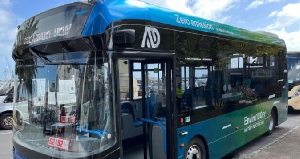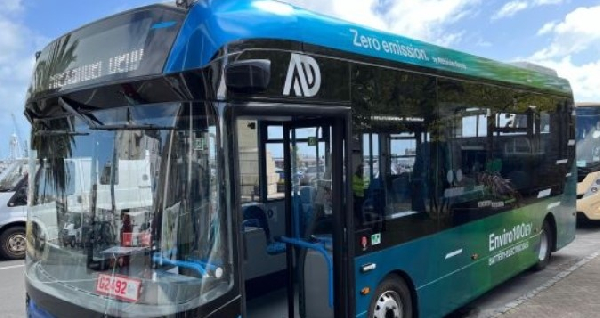 File photo of an electric bus
File photo of an electric bus
In the Fourth Republic of Ghana, the approach to bus procurement has largely favoured the wholesale acquisition of complete buses.
While this model provides immediate solutions to transportation needs, it fails to capture the broader economic benefits, particularly job creation and technological advancement.
To understand the pitfalls of the current approach, it is essential to revisit the successful initiatives of the past, particularly during the tenure of former Head of State General Ignatius Kutu Acheampong.
During Acheampong’s leadership, the population was approximately 11.16 million, and the need for public transportation was critically felt.
Instead of opting for complete bus imports, Acheampong decisively chose to promote local assembly. This foresight led to the establishment of the Neoplan Ghana Limited Assembly Plant at the Abrepo Junction in Kumasi, alongside a workshop and administrative office at Achimota in Accra.
These facilities became instrumental in producing buses for the then Omnibus Service Authority, which was responsible for scheduled bus services across the nation. A similar plant, Willowbrook Ghana Limited, was also established in Accra, enhancing public transport offerings in the capital.
The implications of this model extended far beyond mere bus production. By assembling buses locally, the initiative facilitated job creation across various sectors, providing opportunities for Ghanaians in vehicle body building, upholstery, auto-electrical fields, and mechanical works.
This approach fostered a culture of technological transfer, notably benefiting places like Suame Magazine in Kumasi—a hub for vehicle repair and maintenance where significant innovations began to take root, such as the conversion of wooden mummy trucks into metal-bodied vehicles for public transport.
Contrasting this with the current paradigm in the Fourth Republic reveals a disheartening trend. Over the years, the country has imported vast numbers of buses, yet many remain off the roads or perform poorly on schedules—an anomaly in an era where efficiency and profitability appear more achievable than in Acheampong’s time.
The Acheampong model ensured that mechanics were adequately trained at the manufacturing source, with reliable access to spare parts, thus guaranteeing longer lifespans for vehicles. In contrast, current procurement practices, characterised by unfavourable contracts, are not delivering similar benefits.
To reverse this trend, it is imperative to adopt a procurement strategy reminiscent of the Acheampong model. This could involve revisiting and revitalising existing assembly plants while also establishing additional facilities to accommodate the increasing demand for buses. Not only would this save significant foreign exchange previously reserved for imports, but it would also promote local production.
A compelling financing model could emerge from state-funded assembly plants that would allow the government to own the buses. Subsequently, the operation of these buses could be contracted out to private operators, such as the Ghana Private Road Transport Union (GPRTU), through a leasing arrangement. This model would empower local entrepreneurs while ensuring that operational routes are licensed by Metropolitan, Municipal, and District Assemblies (MMDAs).
The job creation potential of this renewed approach to bus procurement extends beyond assembly plants and technological transfer. It would stimulate an entire ecosystem of workshops focusing on repair and maintenance, thus creating additional job opportunities, enhancing skills and ensuring the longevity of the vehicles on the road.
By learning from the past and investing in local capacities, Ghana can create a sustainable and economically viable public transport system that benefits all citizens.


